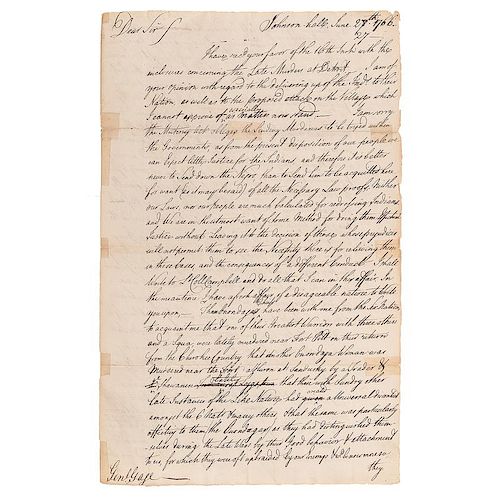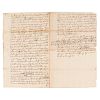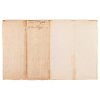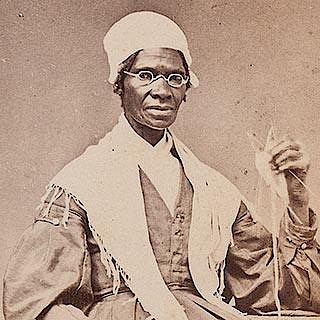Sir William Johnson Draft of Letter to General Gage, Discussing the Justice System & Treatment of Indians, June 1766
About Seller
6270 Este Ave.
Cincinnati , OH 45232
United States
With offices in Cincinnati, Cleveland and Denver, Cowan’s holds over 40 auctions each year, with annual sales exceeding $16M. We reach buyers around the globe, and take pride in our reputation for integrity, customer service and great results. A full-service house, Cowan’s Auctions specializes in Am...Read more
Two ways to bid:
- Leave a max absentee bid and the platform will bid on your behalf up to your maximum bid during the live auction.
- Bid live during the auction and your bids will be submitted real-time to the auctioneer.
Bid Increments
| Price | Bid Increment |
|---|---|
| $0 | $25 |
| $500 | $50 |
| $1,000 | $100 |
| $2,000 | $250 |
| $5,000 | $500 |
| $10,000 | $1,000 |
| $20,000 | $2,500 |
| $50,000 | $5,000 |
| $100,000 | $10,000 |
About Auction
Jun 9, 2017 - Jun 10, 2017
Cowan's Auctions dawnie@cowans.com
- Lot Description
Draft of a manuscript letter from Sir William Johnson to General Gage, June 27, 1766. 2.5pp, 8.25 x 13 in. Very interesting content relating to the justice/legal system and the treatment of Indians. In Johnson's hand and with some of his corrections, but not signed by him. Final form of this letter published in The Papers of Sir William Johnson, Vol. 12, p. 115.
Johnson writes: I have recd. Your favor of the 16th inst. With the inclosures concerning the late Murders at Detroit. I am of your opinion with regard to the delivering up of the Inds. To their Nation, as well as to the proposed attack on the Village which I cannot approve of especially as matters now stand.
I am sorry the Mutiny Act obliges ye Sending Murderers to be tryed within the Government, as from the present disposition of our people we can expect little justice for the Indians, and therefore it is better never to send down the Negro, than to Send him to be acquitted here for want (as it may be said) of all the Necessary Law proofs; neither our laws, not our people are much calculated for redressing Indians. And We are in the utmost want of some method for doing them effectual justice without leaving it to the decision of those whose prejudices will not permit them to see the Necessity there is for relieving them in these cases, and the consequences of a different conduct. I shall write to Lt. Col. Campbell and do all that I can in this affair. [Lieutenant Colonel John Campbell, commandant at Detroit]
He continues: In the meantime I have a fresh affair of a disagreeable nature to write you upon, The Onondagas Chiefs have been with me from the Six Nations to aquaint me that one of their greatest warriors with these others and a squa [sic], were lately murdered near Fort Pitt on their return from the Cherokee Country that another Onondaga Woman was murdered near the Fort, a Huron at Sandusky by a Trader & ye Shawanese lately that these with Sundry other late instances of the like nature had created a Universal discontent amongst the 6 Nat[ion]s ...they therefore by a large belt desired in the name of the whole Confederacy to know what are our intentions in so doing, & our reasons for these late murders in times of peace adding that they feared it might be a means of extinguishing their council fire. To this I made them the best answer I could which however you may suppose cannot be very satisfactory, since all my assurances are daily contradicted by these unjustifiable actions ...[Then they] addressed me concerning the posts lately abandoned which they said they expected would have been demolished according to promises at the end of the War, but that they are sorry to find that the soldiers have been succeeded by settlers, who are equally disagreeable to them & may in a short time be more so as they draw people there to cultivate lands, that they dreaded ye consequences especially as these places were as so many springs of Rum where their young men were constantly drunk, they therefore begged I would represent the same to you, which I promised to do, at the same time telling them that no settlements were intended, & charging them not to offer violence to any who reside at them, as I should give them an answer shortly....
Sir William Johnson (ca 1715-1774) was born in Ireland but immigrated to North America in 1738 to help his uncle, Admiral Peter Warren establish an Irish settlement in New York. Warren had purchased a tract of land and proposed a settlement he named (of course) Warrensburgh. The land was in the middle of the Mohawk land, the easternmost of the Six Nations, and the Irishmen planned to establish trade with the native peoples. Johnson noticed that trading routes went around Warren's land, so he bought property where the trade was and began trading furs with the more northern and western groups.
Johnson learned the Mohawk language and Iroquois customs in order to be more effective in the trade. This in turn put him in a position to act for the British empire. When war in Europe spread to the Americas in 1744 (War of the Austrian Succession), Johnson was appointed Indian agent in New York. He enlisted many of the Iroquois to fight with the British against the French and their Indian allies to the North (one of which was the Huron, long-time rivals of the Iroquois). He fought in a number of skirmishes, but the Battle of Lake George won him the most recognition (and his baronetcy).
Johnson continued to acquire land, including 80,000 acres from the Mohawk. On this land he founded Johnstown, where he established a school for Indian and white children, and built Johnson Hall. Although he never married, Johnson had a couple of "common law" wives. When the first, Catherine Weisenberg, died in 1759, Molly Brant, a Mohawk and the older sister of Joseph Brant, moved into Johnson Hall, giving Johnson even more influence with the Mohawk. Rumors also had it that he had had relationships with Elizabeth and Margaret Brant, among several others, prior to this. Johnson died in 1774 at his home of what is thought to have been a stroke, during an Indian conference.
Thomas Gage (1719 (?) - 1787) was the British Commander-in-chief of forces in North America from 1763-1775. He fought in the early Indian Wars, and became military governor of Massachusetts Bay in 1774 (where he was to implement the Intolerable Acts - punishment for the Boston Tea Party). He fought alongside George Washington during the Indian Wars, and may have encountered Johnson at that time as well. His later actions led to the Battles of Lexington and Concord, sparking the Revolutionary War. In 1775 he was replaced by General William Howe.
Condition VG.Condition
- Shipping Info
-
SHIPPING. At the request of the buyer, Cowan's will authorize the shipment of purchased items. Shipments usually occur within two weeks after payment has been received. Shipment is generally made via UPS Ground service. Unless buyer gives special instructions, the shipping method shall be at the sole discretion of Cowan's Auctions, Inc.. Cowan's is in no way responsible for the acts or omissions of independent handlers, packers or shippers of purchased items or for any loss, damage or delay from the packing or shipping of any property.
-
- Buyer's Premium



 EUR
EUR CAD
CAD AUD
AUD GBP
GBP MXN
MXN HKD
HKD CNY
CNY MYR
MYR SEK
SEK SGD
SGD CHF
CHF THB
THB













